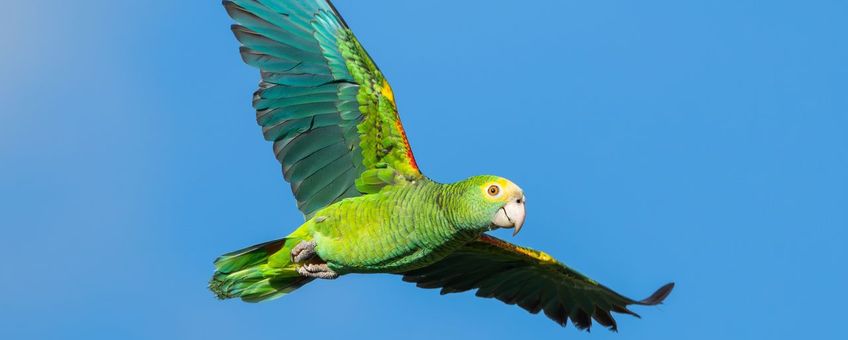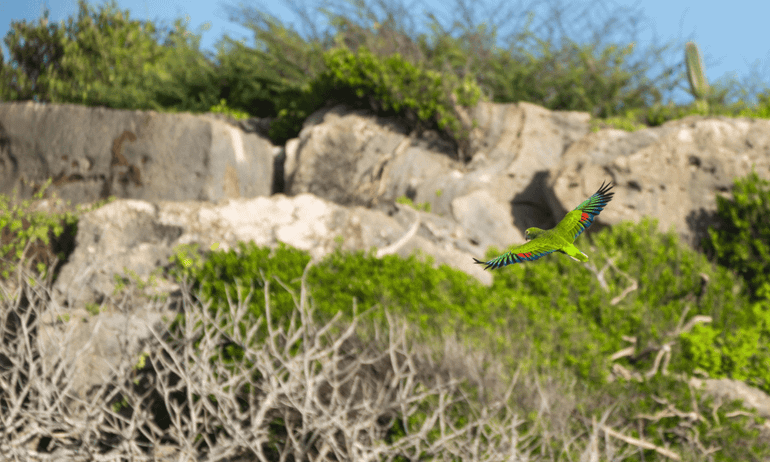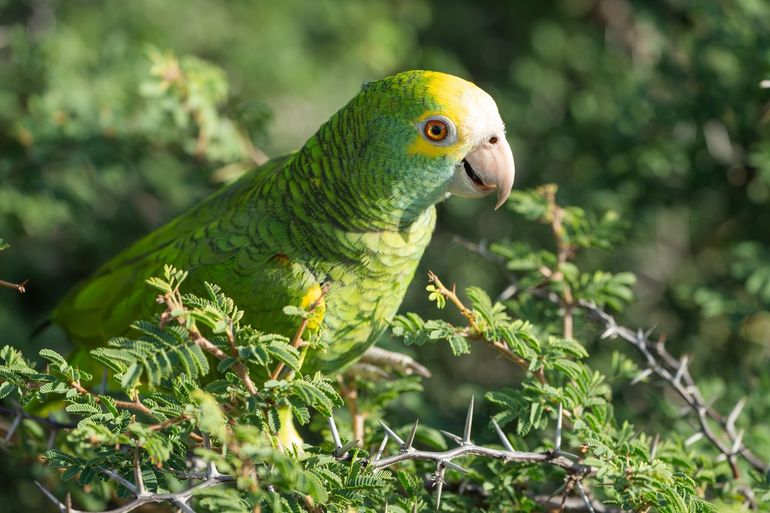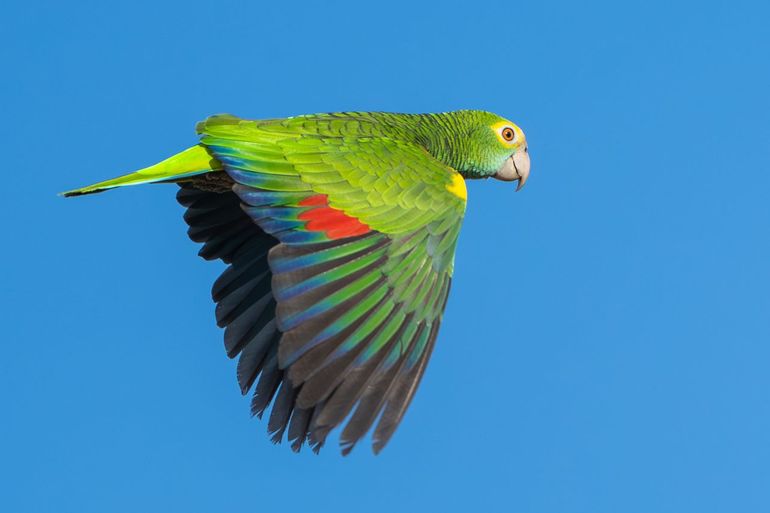
The First Yellow-Shouldered Amazon Take Free Flight Into Aruba’s Nature
Dutch Caribbean Nature Alliance (DCNA)Out of the 25 surviving Lora that were illegally smuggled by sea into Aruba among other poached wildlife in 2022, the first 9 Lora were successfully released in early January into Aruba’s nature in Parke Nacional Arikok, as part of FPNA’s reintroduction plan. FPNA is expected to release the remaining Lora during two other ‘release events’ over the course of the coming two weeks. The reintroduction of the Lora is part of FPNA’s Species Conservation & Reintroduction Program, which aims at establishing a self-sustaining wild population in Aruba over the next decades.

Why did the Lora go extinct in Aruba?
The Lora (Amazona barbadensis) has been a locally extirpated species in Aruba for over half a century, yet continues to hold a significant place in the island’s heritage and in the hearts of the community. A parrot species that is known for being highly social and intelligent and that once graced many locals with its magnificent presence roaming freely in Aruba’s nature, until they went extinct in 1947. Populations of this species continue to exist in isolated places on Bonaire and Curaçao, in addition to northern parts of Venezuela and the Venezuelan islands of Margarita and La Blanquilla. The Lora has been assessed for the IUCN Red List of Threatened Species in 2021 but current estimates the total wild population to be less than 10.000 individuals. For Aruba specifically, the Lora is protected by law under the Nature Ordinance.
To date, there are many threats to the Lora populations, of which most are of human origin. For Aruba in particularly, the Lora was extirpated because of poaching for pet trade or killed for being considered an agricultural pest. In addition to human incurred threats, predators such as domestic cats and rats also pose a big threat to the survival of the Loras. Contrary to popular belief, the Boa constrictor is not the cause of the disappearance of the Lora in Aruba given the Boa was only ‘introduced’ to the island in the early 1990s. The boa is not considered among the main threats to the survival of the Lora today as they have limited food intake in comparison to ‘warm blooded’ predators but also increasingly occur in urbanized areas. Another significant threat that caused the extinction of the Lora is the disappearance of their habitat due to deforestation for development.

Why is the reintroduction of the Lora important?
The Lora played a distinctive ecological function for the island, particularly in seed dispersal. This contributed to the proliferation of specific native plants and trees which in turn supported a broader range of wildlife. Therefore, the reintroduction of the Lora is not only important, but it is necessary as it benefits local habitats, enhances biodiversity and contributes to the overall health of the different ecosystems of Aruba. FPNA’s goal is to a self-sustaining Lora population in Aruba, by reintroducing and restoring the Lora’s wild population for future generations.
It is important to keep in mind that the release of the 25 surviving Lora this year is only the beginning and will require annual supplementation to the wild population before it becomes large enough to be self-sustaining. Currently the Lora are one and a half years old and will only start reproducing at approximately seven years of age. As such, it will take decades before a self-sustaining population can be seen in Aruba.
How to mitigate threats to the newly introduced Lora population
To achieve the goal of a self-sustaining population in Aruba, FPNA will be taking necessary conservation actions – including scientific research and monitoring, raising awareness, driving education and community engagement – while continuing to push for policy development and enforcement to protect the Lora alongside other native bird species.
To mitigate the threats caused by humans, FPNA will embark on a national awareness campaign to educate the community of Aruba on importance of protecting the Lora. FPNA is also developing education materials to be shared with the community of Aruba and specifically with schools across the island. As part of the reintroduction, FPNA will continue its efforts to provide the Lora with suitable habitats and protection, and with that FPNA is working on parallel conservation efforts such as its Flora Biodiversity Enhancement Program where native and threatened species of shrubs and trees will be used for habitat restoration, including those that are food sources for the Lora. In addition, FPNA is doubling down on its efforts to commence promoting nature friendly gardens and gardening among the local garden owners.
The Boa constrictor, a non-native species in Aruba remains a potential predator that is impossible to eradicate given their large population on the island, their elusive habits and successful reproduction. However, research has shown that the Boa is no longer reproducing in protected nature areas but rather in urban areas, its preferred environment due to higher food availability. FPNA will continue with its invasive species management program and the removal of Boas encountered in protected nature areas and future Lora roosting and breeding sites so as to reduce their impact on the Lora.

How can you help?
It takes a village to do nature conservation, and doing it right takes time and requires collaboration with the entire community of Aruba.
FPNA would like to ask residents and visitors to Aruba to help us with monitoring the tagged Lora and keep their eyes and ears open and report any sightings via WhatsApp to FPNA’s Wildlife Hotline at +297 592 4476 or email us at info@arubanationalpark.org. If a Lora is sighted, please provide the information about the location – including a GPS location of where the Lora was seen – and how many were observed. Do not interfere with the Lora. Be respectful, keep your distance and keep cats and dogs at bay, do not feed or try to capture them – that would violate the law protecting this species.
FPNA, its valued partners and volunteers will actively be monitoring the tagged Lora for the coming period and values the support of the community in reporting any sightings.
A heartfelt thank you goes out to every single associate of Fundacion Parke Nacional Aruba who contributed to the reintroduction of the Lora to Aruba today, and to all local partners and international partners World Parrot Trust and Stichting Vogelpark AviFauna for coming to Aruba for this most important and emotional day.
Text: DCNA
Photos: FPNA
